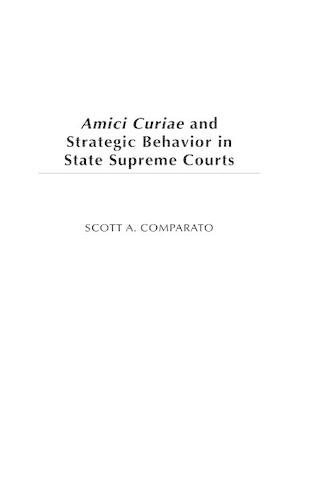
Amici Curiae and Strategic Behavior in State Supreme Courts
(Hardback)
Publishing Details
Amici Curiae and Strategic Behavior in State Supreme Courts
By (Author) Scott A. Comparato
Bloomsbury Publishing PLC
Praeger Publishers Inc
30th September 2003
United States
Classifications
Tertiary Education
Non Fiction
347.7326
Physical Properties
Hardback
192
Description
Applying strategic approaches to both interest groups as amici curiae and state supreme court justices, Comparato investigates the influence of judicial retention methods and the ballot initiative on their behaivor. The results demonstrate that they behave strategically, attempting to achieve their goals within the confines of the institutional setting. What impact do state-level institutions have on the behavior of state supreme court justices and interest groups participating as amici curiae in those courts Specifically, is the information provided by interest groups conditioned on the judicial retention system, or whether the state uses the ballot initiative, and does that information impact the decision-making process of the justices Comparato answers these questions by employing strategic theories of judicial and group behavior, with groups motivated by the attainment of policy and group maintenance, and state supreme court justices motivated by policy and the continued maintenance of their position on the court. He argues that the information provided in amicus curiae briefs allows both groups and state supreme court justices to achieve their respective goals. In order to answer these questions, Comparto analyzes litigant and amicus curiae briefs as well as judicial decisions from seven state supreme courts to evaluate the effects of state-level institutions on the types of information provided to state supreme court justices, and how those justices respond to that information. The results suggest that interest groups do behave strategically, providing information to justices that they believe will be useful in helping the justices retain their seats on the court and achieve their desired policy outcomes. There is also support for the expectation that the information provided by litigants and amici, as well as the retention method, have a direct impact on the decision-making of justices.
Reviews
[A]n important contribution in presenting an informational theory of amicus behavior and judicial use of amicus briefs. Despite the large body of existing work on interest groups in the courts, our understanding of how and why amimici matter in the decision making process remains shadowy. The informational theory Comparato articulates in this book offers to shed some light on those questions.-Law and Politics Book Review
[U]ndertakes an exploration of how institutional design and state political enviornments structure the behavior of litigants and amici in terms of arguments they raise and the behavior of judges vis-a'-vis case outcomes. In doing so, Comparato offers an explicitly strategic account of the behavior of litigants, amici, and judges that link the goals of each to the choices that they make.-Wendy L. Martinek, Department of Political Science, Binghamton University.
"An important contribution in presenting an informational theory of amicus behavior and judicial use of amicus briefs. Despite the large body of existing work on interest groups in the courts, our understanding of how and why amimici matter in the decision making process remains shadowy. The informational theory Comparato articulates in this book offers to shed some light on those questions."-Law and Politics Book Review
"Undertakes an exploration of how institutional design and state political enviornments structure the behavior of litigants and amici in terms of arguments they raise and the behavior of judges vis-a'-vis case outcomes. In doing so, Comparato offers an explicitly strategic account of the behavior of litigants, amici, and judges that link the goals of each to the choices that they make."-Wendy L. Martinek, Department of Political Science, Binghamton University.
"[A]n important contribution in presenting an informational theory of amicus behavior and judicial use of amicus briefs. Despite the large body of existing work on interest groups in the courts, our understanding of how and why amimici matter in the decision making process remains shadowy. The informational theory Comparato articulates in this book offers to shed some light on those questions."-Law and Politics Book Review
"[U]ndertakes an exploration of how institutional design and state political enviornments structure the behavior of litigants and amici in terms of arguments they raise and the behavior of judges vis-a'-vis case outcomes. In doing so, Comparato offers an explicitly strategic account of the behavior of litigants, amici, and judges that link the goals of each to the choices that they make."-Wendy L. Martinek, Department of Political Science, Binghamton University.
Author Bio
SCOTT A. COMPARATO is Assistant Professor of Political Science at Southern Illinois University, Carbondale. His primary research interests center on judicial decision-making, state supreme courts, and interest group participation in the courts. Other recent work addresses the conditions under which state supreme courts comply with decisions of the Supreme Court.
